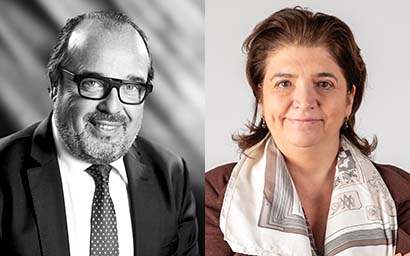Passive or active? Jean-Marie Catala and Arabelle Conte, of France’s AFG funds association, advocate for a diversified investment model.
Can we conclude that – from all points of view – retail investors should prefer passive management? To answer this, we need to take a deep dive into both cost and performance comparisons. Looking only at the cost of financial instruments without considering the cost for investment services, active funds appear to be more expensive, due to the fact they intend to deliver the best performance using active management, while a passive fund’s objective is to deliver the performance of an index and simply bear the cost of accessing the market.
Yet, last November, KPMG published a study that demonstrated that total cost of ownership (TCO) is equivalent in the two existing remuneration models for retail investors (commission-based and fee-based) and does not depend on whether the cost of investment services is included (commission-based) or is paid separately (fee-based).
What about performance, though? Based on widely used approaches to compare active and passive fund performances, investors may have too dogmatic a view about the merits of each style. Yet many of the existing comparisons are incomplete mainly because they do not take into account the costs of ETFs and compare funds with different investment objectives.
In our search for a fair comparison, we relied on work performed by an independent French consulting firm, BSD Investing, who advise on active/passive fund selection using a database and a thorough methodology for fair comparisons.
Based on over 31 different universes from equity to fixed income through a wide range of strategies, and a broad view of performance across asset classes and categories over the past ten years, BSD Investing’s research shows that active/passive results are decidedly more mixed than commonly believed:
- On average, 38% of active managers outperformed their passive counterparts. This figure is materially different from the 13% calculated based on standard market assumptions.
- Additionally, 57% of the time, active funds outperformed passive over the same period on a rolling basis over ten years. Active funds underperformed passive funds 43% of the time. This implies that staying invested 100% in passive funds would have been suboptimal as the upside potential is lost 57% of the time. Staying 100% in active funds would have been suboptimal as the upside potential is lost 43% of the time.
The same methodology also allows us to reaffirm that active fund managers’ performance depends on market cycles. Looking at the most recent bear market during the Covid-19 crisis and at the average over 20 years with the right tools gives interesting insights and demonstrates the ability of active management to outperform during bear markets.
Among the equity universes that experienced a downturn, on average, 67% of active managers outperformed passive funds during the Covid-19 market crisis. Additionally, the study shows that 58% of active managers succeeded in outperforming passive management in bear markets over the past 20 years; only 27% did it during bull markets.
Both active and passive management styles can add value to investment portfolios and have a role to play in building all-weather, outperforming allocations.
Jean-Marie Catala is the AFG’s marketing committee chair. Arabelle Conte is head of distribution and client relationship
© 2022 funds europe





